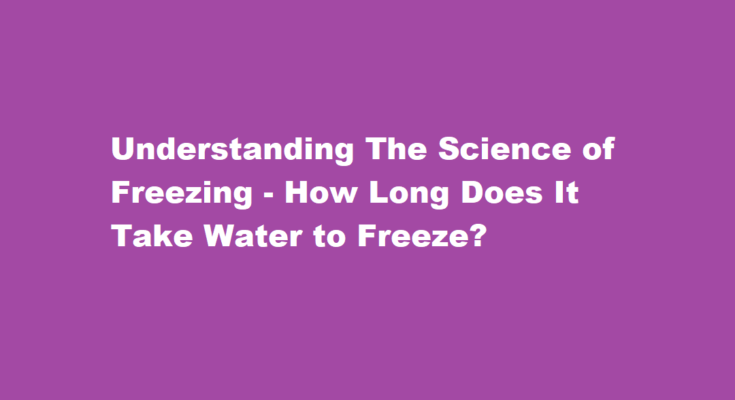Introduction
Water, a fundamental substance for life on Earth, exhibits various remarkable properties. One of its most intriguing behaviors is its ability to transform from a liquid to a solid state when the temperature drops low enough. But have you ever wondered how long it takes for water to freeze under different conditions and what factors influence this process? In this article, we will explore the science behind freezing water and the variables that affect the time it takes for water to solidify.
The Science of Freezing
Freezing is a phase transition in which a substance changes from a liquid to a solid state. This process occurs when a substance loses enough thermal energy, causing its molecules to slow down and arrange themselves into a rigid, ordered structure. In the case of water, the freezing point, or the temperature at which it turns into ice, is 0 degrees Celsius (32 degrees Fahrenheit) at standard atmospheric pressure.
Factors Affecting Freezing Time
Several factors influence how long it takes for water to freeze
1. Temperature: The primary factor determining the freezing time of water is the surrounding temperature. Water will freeze faster at lower temperatures. However, other factors come into play, as water’s freezing process isn’t solely dependent on temperature.
2. Container and Volume: The size and shape of the container holding the water can significantly impact freezing time. A small amount of water in a shallow dish will freeze faster than a large volume of water in a deep container due to the increased surface area exposed to the cold air.
3. Agitation: Agitating the water by stirring or introducing some form of turbulence can accelerate the freezing process. This helps distribute the cold temperature more evenly throughout the liquid.
4. Impurities: Pure water freezes more quickly than water containing impurities like minerals or solutes. The presence of impurities lowers the freezing point and may also cause supercooling, a phenomenon where the liquid remains in a liquid state below its freezing point until a nucleation site is introduced.
5. Insulation: The type of container used and its insulating properties can impact freezing time. For instance, a metal container conducts heat away from the water faster than a plastic or glass container, leading to faster freezing.
6. Airflow: The circulation of cold air around the container can expedite the freezing process. Placing the container in a freezer or an area with good air circulation will help remove heat more efficiently.
7. Humidity: Low humidity levels can speed up the freezing process as dry air helps to evaporate surface water, removing heat from the liquid more quickly.
Experimental Analysis
To better understand how long it takes water to freeze under various conditions, let’s consider a few scenarios
1. Freezing in a Typical Home Freezer: In a standard home freezer set at around -18 degrees Celsius (0 degrees Fahrenheit), a small container with a few ounces of water may take around 1-2 hours to freeze. Larger volumes may require several hours to solidify.
2. Supercooling: Supercooling is a phenomenon in which water remains liquid below its freezing point. It can take a variable amount of time for supercooled water to freeze, as it depends on when a nucleation site (like an ice crystal or disturbance) triggers the crystallization process.
3. Ice Cube Trays: When using an ice cube tray in a typical home freezer, small individual cubes may freeze within 1-2 hours, while larger cubes could take longer.
4. Outdoor Freezing: The time it takes for water to freeze outdoors varies greatly depending on the environmental conditions. In extremely cold conditions, water can freeze rapidly, even within minutes, whereas milder temperatures might take hours.
FREQUENTLY ASKED QUESTIONS
Can ice freeze in 30 minutes?
The short answer is 2-4 hours to be completely frozen. Based on scientific experiments, the initiation of freezing varies between 30 minutes to 1 hour and 40 minutes depending on the initial temperature of the water.
Does water freeze in 1 hour?
Typically, it takes around two to three hours for a small container of water to freeze in a standard freezer. However, larger volumes of water, such as a gallon of water or more, can take several hours to freeze completely.
Conclusion
The time it takes for water to freeze depends on a multitude of factors, including temperature, volume, container type, and the presence of impurities. Understanding these variables can be useful for a wide range of practical applications, from making ice cubes to preserving food. Additionally, the scientific principles behind freezing offer insights into how materials change states under different conditions.
Water’s ability to freeze is not only a fascinating physical process but also a fundamental one, with implications for various aspects of daily life. So the next time you’re waiting for your ice cubes to form or observing water turn into icicles on a cold winter day, you can appreciate the intricate science behind how long it takes water to freeze.
Read Also : Dissolving Bone Spurs Naturally – Effective Strategies for Relief



